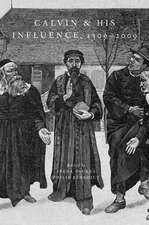Calvinism on the Frontier, 1600-1660: International Calvinism and the Reformed Church in Hungary and Transylvania: Oxford Historical Monographs
Autor Graeme Murdocken Limba Engleză Hardback – 3 aug 2000
Din seria Oxford Historical Monographs
- 19%
 Preț: 497.26 lei
Preț: 497.26 lei - 12%
 Preț: 310.34 lei
Preț: 310.34 lei - 30%
 Preț: 539.99 lei
Preț: 539.99 lei - 15%
 Preț: 244.01 lei
Preț: 244.01 lei - 13%
 Preț: 532.53 lei
Preț: 532.53 lei - 30%
 Preț: 499.46 lei
Preț: 499.46 lei - 30%
 Preț: 497.67 lei
Preț: 497.67 lei - 30%
 Preț: 499.18 lei
Preț: 499.18 lei - 30%
 Preț: 498.68 lei
Preț: 498.68 lei - 30%
 Preț: 604.98 lei
Preț: 604.98 lei - 30%
 Preț: 497.63 lei
Preț: 497.63 lei - 24%
 Preț: 496.31 lei
Preț: 496.31 lei - 30%
 Preț: 498.68 lei
Preț: 498.68 lei - 22%
 Preț: 497.81 lei
Preț: 497.81 lei - 25%
 Preț: 556.27 lei
Preț: 556.27 lei - 14%
 Preț: 539.57 lei
Preț: 539.57 lei - 30%
 Preț: 500.29 lei
Preț: 500.29 lei - 13%
 Preț: 533.57 lei
Preț: 533.57 lei - 25%
 Preț: 569.72 lei
Preț: 569.72 lei - 30%
 Preț: 610.82 lei
Preț: 610.82 lei - 34%
 Preț: 1153.34 lei
Preț: 1153.34 lei - 51%
 Preț: 614.88 lei
Preț: 614.88 lei - 34%
 Preț: 1195.31 lei
Preț: 1195.31 lei - 34%
 Preț: 1035.84 lei
Preț: 1035.84 lei - 34%
 Preț: 1006.40 lei
Preț: 1006.40 lei - 29%
 Preț: 864.39 lei
Preț: 864.39 lei - 34%
 Preț: 1160.09 lei
Preț: 1160.09 lei - 34%
 Preț: 1432.67 lei
Preț: 1432.67 lei - 31%
 Preț: 328.46 lei
Preț: 328.46 lei - 34%
 Preț: 574.40 lei
Preț: 574.40 lei - 34%
 Preț: 1067.93 lei
Preț: 1067.93 lei - 34%
 Preț: 1004.62 lei
Preț: 1004.62 lei - 31%
 Preț: 331.22 lei
Preț: 331.22 lei - 34%
 Preț: 1153.28 lei
Preț: 1153.28 lei - 34%
 Preț: 1254.66 lei
Preț: 1254.66 lei - 34%
 Preț: 946.79 lei
Preț: 946.79 lei - 34%
 Preț: 962.63 lei
Preț: 962.63 lei - 34%
 Preț: 1126.38 lei
Preț: 1126.38 lei - 31%
 Preț: 469.27 lei
Preț: 469.27 lei - 23%
 Preț: 332.04 lei
Preț: 332.04 lei - 28%
 Preț: 375.23 lei
Preț: 375.23 lei - 34%
 Preț: 1049.14 lei
Preț: 1049.14 lei - 34%
 Preț: 1036.73 lei
Preț: 1036.73 lei - 51%
 Preț: 757.67 lei
Preț: 757.67 lei - 34%
 Preț: 1082.61 lei
Preț: 1082.61 lei - 34%
 Preț: 1155.39 lei
Preț: 1155.39 lei - 31%
 Preț: 328.53 lei
Preț: 328.53 lei - 34%
 Preț: 1110.12 lei
Preț: 1110.12 lei - 31%
 Preț: 487.75 lei
Preț: 487.75 lei - 34%
 Preț: 1153.41 lei
Preț: 1153.41 lei
Preț: 1417.33 lei
Preț vechi: 2158.87 lei
-34% Nou
Puncte Express: 2126
Preț estimativ în valută:
271.20€ • 283.92$ • 224.40£
271.20€ • 283.92$ • 224.40£
Carte tipărită la comandă
Livrare economică 26 martie-01 aprilie
Preluare comenzi: 021 569.72.76
Specificații
ISBN-13: 9780198208594
ISBN-10: 0198208596
Pagini: 376
Ilustrații: 1 map
Dimensiuni: 146 x 224 x 24 mm
Greutate: 0.55 kg
Editura: OUP OXFORD
Colecția OUP Oxford
Seria Oxford Historical Monographs
Locul publicării:Oxford, United Kingdom
ISBN-10: 0198208596
Pagini: 376
Ilustrații: 1 map
Dimensiuni: 146 x 224 x 24 mm
Greutate: 0.55 kg
Editura: OUP OXFORD
Colecția OUP Oxford
Seria Oxford Historical Monographs
Locul publicării:Oxford, United Kingdom
Recenzii
Murdock painstakingly underscores the international dimensions of the Reformed movement in Hungary and Transylvania.
Murdock's entirely fresh material casts vivid and unexpected light upon more familiar Reformed experiences further west, making this unquestionably one of the most impressive and valuable books published in the field of international Calvinism in recent years.
Graeme Murdock's first book provides the best synoptic, monographic study of any major Calvinist community in its full interntational context currently available in print. That his subject is the most exotic and little-known major branch of the international Reformed tradition makes his achievement all the more remarkable; and the difficulty of the Hungarian sources and literature upon which it is predominantly based will further guarantee his book grateful readers and a very long shelf life. Aside from the sheer novelty of its material, perhaps the book's most invaluable and refreshing feature is its internationalism, which stems directly from conditions within the region studied.
Murdock's main argument is enlivened by a wealth of telling details ... The book is a pleasure to read and will hopefully be an eye-opener to many for whom, until now, the history of Hungarian and Transylvanian Calvinism seemed to be not more than an exotic footnote to the history of Calvinism at large.
This is a very important volume presenting an exciting look at one of the least known branches of the Calvinist International. Scholars interested in social control, religious reform, toleration, and intellectual thought will find much here to interest them ... It is certainly a most welcome addition to our understanding of Calvinism and early modern Hungarian lands.
A very interesting and extremely useful historical account.
This study is significantly more important than just another case study of Calvinism. The success of Calvinism in the Hungarian lands remains, until now, a story largely unknown to the wider historical community. Again, that alone makes this work interesting. The peculiarities of the socio-political situation in Hungary and Transylvania, however, makes this volume truly fascinating.
Murdock's entirely fresh material casts vivid and unexpected light upon more familiar Reformed experiences further west, making this unquestionably one of the most impressive and valuable books published in the field of international Calvinism in recent years.
Graeme Murdock's first book provides the best synoptic, monographic study of any major Calvinist community in its full interntational context currently available in print. That his subject is the most exotic and little-known major branch of the international Reformed tradition makes his achievement all the more remarkable; and the difficulty of the Hungarian sources and literature upon which it is predominantly based will further guarantee his book grateful readers and a very long shelf life. Aside from the sheer novelty of its material, perhaps the book's most invaluable and refreshing feature is its internationalism, which stems directly from conditions within the region studied.
Murdock's main argument is enlivened by a wealth of telling details ... The book is a pleasure to read and will hopefully be an eye-opener to many for whom, until now, the history of Hungarian and Transylvanian Calvinism seemed to be not more than an exotic footnote to the history of Calvinism at large.
This is a very important volume presenting an exciting look at one of the least known branches of the Calvinist International. Scholars interested in social control, religious reform, toleration, and intellectual thought will find much here to interest them ... It is certainly a most welcome addition to our understanding of Calvinism and early modern Hungarian lands.
A very interesting and extremely useful historical account.
This study is significantly more important than just another case study of Calvinism. The success of Calvinism in the Hungarian lands remains, until now, a story largely unknown to the wider historical community. Again, that alone makes this work interesting. The peculiarities of the socio-political situation in Hungary and Transylvania, however, makes this volume truly fascinating.













